|
|
|
Sort Order |
|
|
|
Items / Page
|
|
|
|
|
|
|
| Srl | Item |
| 1 |
ID:
167188
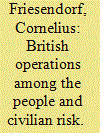

|
|
|
|
|
| Summary/Abstract |
Debates on military intervention and small wars often include the claim that soldiers should operate among civilians in order to avoid civilian casualties and to protect civilians against third-party violence. This article, by contrast, points at negative unintended consequences of military operations taking place in close proximity to local populations: it argues that also risk-tolerant militaries cause civilian casualties and that their presence triggers third-party violence against civilians. The British military, in particular the British Army, exported risk-tolerant practices from Northern Ireland to the Balkans, with sporadic success. But in southern Iraq and in Helmand, British ground operations harmed civilians. The findings suggest that the chances for protection are better in operations where levels of violence are relatively low than in counterinsurgency where troops face ruthless and well-endowed enemies operating among civilians.
|
|
|
|
|
|
|
|
|
|
|
|
|
|
|
|
| 2 |
ID:
167192
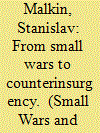

|
|
|
|
|
| Summary/Abstract |
The complicated problematic of Imperial Policing in many respects still comes down to the principle of minimum force, and much of what we consider an integral part of the modern doctrine of counterinsurgency, is perceived as by-product of post-1945 colonial experience. Charles Gwynn wrote about it in his still underestimated text-book on internal security, ‘Imperial Policing’. As a result, there is a lack of clear understanding how colonial (based on local experience) knowledge was transformed into the expert (universal, transferable) knowledge in confronting rebellions at the doctrinal level. This article examines the work of Gwynn as part of a transitional stage from the age of global empires to the age of nuclear superpowers within the context of internal security doctrine. Adaptation to the new realities during the interwar period and after the World War II – reconfiguration of the British army epistemological system in confronting insurgencies – was a hard process. In this sense, the question about transformation of colonial knowledge into expert knowledge onto the field of internal security is a part of a more general and sensitive question about transition from colonialism to the post-colonial age.
|
|
|
|
|
|
|
|
|
|
|
|
|
|
|
|
| 3 |
ID:
167185
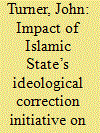

|
|
|
|
|
| Summary/Abstract |
Al Qaeda following 9-11 experienced a period of stagnation which it sought to remedy through a project of re-branding. Critical of this approach, Islamic State claimed that al Qaeda was an elitist organization that had facilitated the stagnation of the Salafi Jihadist project. In an attempted to claim dominance over the jihad, Islamic State’s endeavored to discredit al Qaeda through a process it presented as ideological correction, linked to Islamic eschatology, sectarian agitation, permissive violence, and the caliphate. Following Islamic State’s acquisition of vast territory in Iraq and Syria, arguments proliferated that Islamic State had surpassed al Qaeda. As the caliphate has collapsed what effects will this have on al Qaeda’s fortunes and strategy? It is argued that Islamic State has provided al Qaeda’s strategic approach with renewed vigour to help ensure its survival and pursue resurgence. Al Qaeda acting in concert with the meta-strategy for survival concept, has altered an existential threat into an advantage through disavowing Islamic State’s methods, continuing to engage with localism, and pursuing rebranding by positioning itself as a moderate alternative. The cases of al Qaeda affiliates in Yemen, Syria, West Africa, and South Asia are instructive in assessing the effectiveness of al Qaeda’s resurgence.
|
|
|
|
|
|
|
|
|
|
|
|
|
|
|
|
| 4 |
ID:
167182
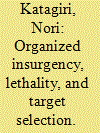

|
|
|
|
|
| Summary/Abstract |
I examine the relationship between organizational stability, lethality, and target selection, and attack method of Southeast Asian insurgency. I do so by comparing the Abu Sayyaf Group (ASG) and Jemaah Islamiyah (JI), using data of their activities between 1994 and 2015. I make two arguments. First, organizationally unstable insurgency groups tend to see their members increase generate more casualties, while stable groups often experience reduction of violence. Second, organizational instability makes it more likely for groups to target civilian populations and business infrastructure than government, military and police forces, and transportation buildings. In contrast, organizational stability has limited explanatory power on its attack methods.
|
|
|
|
|
|
|
|
|
|
|
|
|
|
|
|
| 5 |
ID:
167186
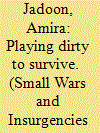

|
|
|
|
|
| Summary/Abstract |
U.S. military aid provides recipient governments the fighting capability they require to undermine domestic militant groups, which can undermine groups’ leadership structures and trigger group splintering. In this environment, brutal attacks against non-combatants become an effective mechanism for targeted groups to signal their resolve and outbid competitors. A large-n analysis of U.S. military aid between 1989 -2011 links higher levels of military aid with higher levels of rebel-perpetrated civilian killings, and deaths due to explosive attacks on non-combatant targets. A closer examination of the case of Pakistan sheds further light on the underlying causal mechanisms.
|
|
|
|
|
|
|
|
|
|
|
|
|
|
|
|
| 6 |
ID:
167191
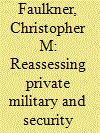

|
|
|
|
|
| Summary/Abstract |
This paper challenges recent claims that competitive market dynamics incentivize Private Military and Security Companies (PMSCs) to fully commit to providing effective services, thereby reducing the duration of civil war. Our assessment of a most-likely case scenario for this argument – Sierra Leone – reveals four critical problems. First, there is rarely direct competition, even if numerous companies are present. Second, the presence of multiple PMSCs usually represents a collaboration among subsidiaries providing distinct services, often under the same corporate umbrella. Third, data aggregation obfuscates the overlap of PMSC presence, inflating the amount of perceived competition. Finally, we raise concerns regarding how quantitative analyses can conflate conflict intensity with conflict termination.
|
|
|
|
|
|
|
|
|
|
|
|
|
|
|
|
| 7 |
ID:
167183
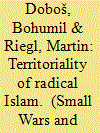

|
|
|
|
|
| Summary/Abstract |
The paper compares political territoriality of selected jihadist violent non-state actors. Looking at selected groups that attempted to control territory (Afghan Taliban, Al-Shabaab, the Islamic State), it attempts to establish a generalization regarding the use of territory by this type of violent non-state actors. To this end, it analyses connection of territory to groups´ security provision, economic activity, and identity. Despite many differences among the groups, it concludes that these groups often utilize both territorial and personal characteristics. Territoriality of these actors is reactive as they are unable to present a sustained control in contested regions.
|
|
|
|
|
|
|
|
|
|
|
|
|
|
|
|
| 8 |
ID:
167181


|
|
|
|
|
| Summary/Abstract |
By utilizing the theory of Strategic Action Fields (SAFs), the present article explains how a new meso-level social order seems to have emerged in Mexico as a result of the paramilitarization of organized crime, militarization of security, and the opening of Mexico’s energy sector to private investment. This work describes the transformation of Mexico’s energy field after a process of major constitutional and economic changes that were the consequence of a security crisis and an agenda of energy reform for which the so-called ‘drug war’ was a key underlying foundation.
|
|
|
|
|
|
|
|
|
|
|
|
|
|
|
|
| 9 |
ID:
167194


|
|
|
|
|
| Summary/Abstract |
When on the wrong end of an asymmetry in the projection of hard power, weaker sides countenance the grim arithmetic of avoiding direct and massed confrontations. Invariably, insurgents have over the ages tended to employ indirect tactical methods to render their stronger opponents ineffective. Ultimately – interest asymmetry, regime type, asymmetries of strategy, and external intervention – combine in a complex interplay and pattern, to militate against a strong side. In Sudan, these factors interacted throughout the civil wars to produce regional autonomy and finally an independent South Sudan in 2011. Similar strategic logic had confronted many large African states battling insurgencies in Ethiopia, Angola, Nigeria, Zaire, and apartheid-era South Africa. Oftentimes, weakening public resolve has caused these governments to accommodate, capitulate or withdraw even if they try not to blink. Notwithstanding the regime type, it can be concluded that the majority of strong actors are prone to fail in a protracted, asymmetric conflict. Hence, the notion of linking victory in counterinsurgency to the degree of openness (democratic polyarchies); or closeness (totalitarianism) – is still valid but highly contestable in the case of Africa’s large dysfunctional states.
|
|
|
|
|
|
|
|
|
|
|
|
|
|
|
|
|
|
|
|
|